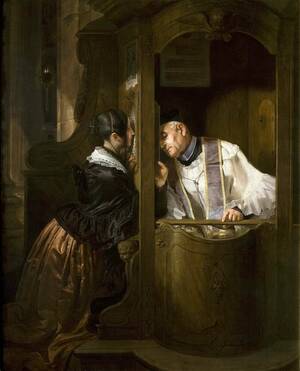In almost 40 years as a priest, I have heard thousands of confessions. I love hearing confessions. In fact, I would say that it’s among the top three things that I do as a priest. Though I am a poor representative of Jesus, I love extending his mercy and forgiveness to all who come to receive the Sacrament of Confession.
I am forever grateful to Sister Joan Volpe, FMA, my first-grade nun. She taught me to do two things that have served me since then: to read and to say the Act of Contrition. I have a love-hate relationship with this prayer.

Anyone who knows me knows that my deepest self-definition is that “I am a sinner whose sins are forgiven.” This has been true for almost 70 years, and I have used these exact words to describe myself for decades. You can imagine how happy I was when I saw Pope Francis’ first interview after he became pontiff. He was asked, “Who are you?” He responded, “I am a sinner.” I loved him immediately.
When a Pope dies, all the cardinals and archbishops in charge of the various dicasteries lose their jobs. All the offices and dicasteries close until a new Pope is elected. But there are a few officials who do not lose their jobs and their offices do not close. One of these is the cardinal in charge of the Apostolic Penitentiary. The office does not close because the Church recognizes that we are always in need of God’s forgiveness, and such an office can never stop operating.
So why do I take exception to some words of the Act of Contrition? It has some good theology and some bad theology. There are several versions of the Act of Contrition in English and lots of versions in Spanish. And when you hear confessions for 40 years, you hear every version there is.
The bad theology is that every Act of Contrition expresses sorrow for one’s sins because “I dread the loss of heaven and the pains of hell.” Or “I detest all my sins because of thy just punishments.” That’s the bad theology.
They all go on to say, I am sorry “most of all because they offend thee my God, who are all good and deserving of all my love.” America magazine reported on remarks Pope Francis made in a recent talk to priests and seminarians. “It is beautiful,” he said, when a penitent, reciting the Act of Contrition, recognizes that God is “all good and deserving of all my love.” That’s the good theology. But I fear that we have taught people to be sorry more because of losing heaven and going to hell than because our sins offend God.
Trying to be good and do the right thing and be a holy person out of “fear of hell” won’t sustain a person over the long haul of life. Nor is it a good reason to not sin. The prayer should teach us to be sorry for our sins because they offend God, who only loves us more and more.
The ending of the Act of Contrition is not helpful. “I firmly intend with the help of thy grace to sin no more and to avoid the near occasions of sin.” Those words are setting yourself up for failure. Of course, we try not to sin, but we are going to sin. We’re going to sin again, and maybe even before we get out of the church by thinking someone’s hairdo looks silly and making a judgment about them. OK, I’m projecting.
If we are honest, we know that we will sin again and again and again. Thus, praying “to sin no more” is not helpful. Perhaps we should pray, “I firmly intend with the help of your grace to turn again to you the next time that I sin.” That’s more accurate.
The most ancient Act of Contrition and the one that says it all is this one: “Lord Jesus Christ, Son of the Living God, have mercy on me, a sinner.” This one avoids all the language of punishment and reward while continuing to acknowledge that we are sinners in need of God’s mercy.
This prayer, commonly known as the “The Jesus Prayer” is as ancient as Christianity. It is a prayer that monks try to say continuously over and over and over until it becomes part of their breathing. It’s short and beautiful and accurate and to the point. We are all sinners in need of God’s mercy. We will always be sinners and God’s mercy will always be available to us.
Lord, Jesus Christ, Son of the Living God, have mercy on me, a sinner.
Father Joe Corpora is associate director of the Transformational Leaders Program. He is a priest-in-residence at Dillon Hall and one of 700 priests whom Pope Francis appointed in 2016 to serve as Missionaries of Mercy. His most recent book about this latter experience is Doing Mercy: A Path to Contemplation.